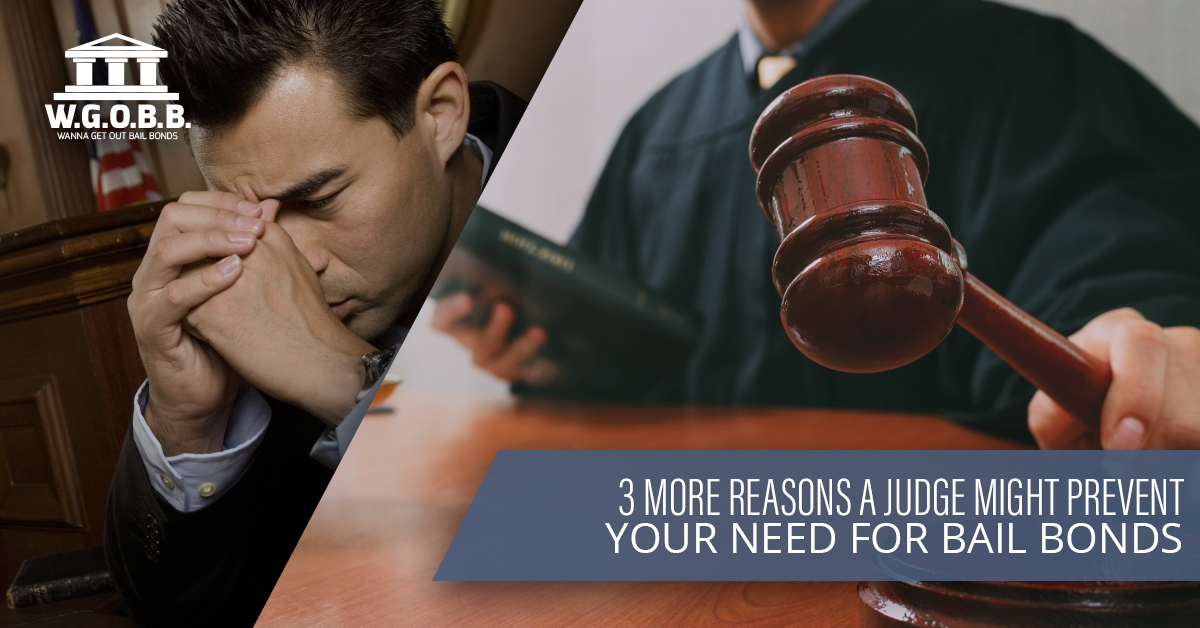Your Go-To 24-Hour Bail Bonds Company on Oahu
Offering experienced, affordable bail help 24/7.

3 More Reasons A Judge Might Prevent Your Need For Bail Bonds
In our previous blog, we detailed four of the most common questions judges ask themselves when deciding whether or not to grant someone bail. The severity of the crime has a lot to with it, as murder or kidnapping will almost certainly cause a judge to deny bail. The judge will also consider whether or not the accused is a flight risk, because someone who is accused of a heinous crime is more likely to try to avoid the trial altogether. Finally, we discussed two other questions a judge might consider regarding safety: “are they a danger to themselves?” and “are they a danger to others?”
That’s not all that a judge has to consider when wondering whether or not someone will be able to use a bail bond service and get out of jail until the court date. While the four questions we mentioned above regard how the accused might deal with society and people, the questions below have to do with how someone who has been arrested has dealt with the legal system. Let’s take a look.
Was The Accused Respectful?
Like we said before, most people are eligible for bail. All they have to do is plead “guilty” or “not guilty” before being allowed to post bail. A judge will approach most arraignments with the default idea of setting bail, but there’s one thing that can change their mind in an instant: disrespect to the court.
Judges have worked hard their entire lives in order to reach the position. They have attained a status that deserves respect, and will respond negatively if disrespected. They also have deep respect for the legal system of which they are a part. If someone is abusive toward the judge or anyone else in the courtroom, it’s not uncommon for a judge to make the last minute decision to deny bail. A person who is belligerent during their time in the courtroom (a time they should be on their best behavior) is kind of tipping their cards as to how they’ll act if released on bail. This is especially true because there are usually quite a few hours between being arrested and the arraignment, time that they should have been cooling down.
Oh, and if the judge hears “if they let me out, I’m not coming back,” that will almost certainly keep the accused in jail!
Were They Already On Probation or Parole?
There’s a reason you’ve heard the phrase “first-time offender.” A person who has never been in trouble with the law before is often given some form of leniency, because everyone makes mistakes and the judge usually isn’t interested in ruining anyone’s life over relatively small matters.
But if someone has already been in trouble with the law and is out on probation, parole, or bail, then the judge is almost certainly going to deny bail this time around. Someone who has been released from jail or prison but has shirked their responsibility to the legal system by getting in trouble again will have a much more difficult time convincing a judge that they should again be released. That’s why it’s always so important to keep your nose clean whenever you’ve paid your bail money or are out on parole/probation.
Are They A Citizen of the United States?
This isn’t a question that comes up as often here on O’ahu as it does in other parts of the country, but it’s certainly something to consider.
The legal status of everyone who is arrested is checked. If a person is found to be in the country illegally, that doesn’t mean that they’re immediately deported. But it could mean that they’re denied bail because they could be a flight risk. A person who’s lived most of their adult life in the United States may be allowed bail because they have no connections to the country in which they were born. But someone who has been in the country illegally for only a few months might be denied bail because they would likely skip bail and return to their home country.
If You Can Post Bail, Contact W.G.O.B.B.!
When you combine the questions a judge might ask themselves with the four we detailed in this article, you might think that judges would be denying bail left and right. But considering that most crimes for which people are arrested don’t violate the reasons we’ve detailed, judges end up granting bail to the majority of people they see in a day.
We hope that none of the answers to the above questions cause the judge to deny you bail. If a judge has said that you can post bail and get out of jail, we hope you’ll choose Wanna Get Out Bail Bonds as your bail bond company. Give us a call as soon as you can and we’ll make the entire bail bond service as easy as possible.
Get in Contact Now and Make Bail Fast.
Experienced local bail agents are waiting for you 24/7.
"*" indicates required fields
The Benefits of a Professional Bondsman:
Get Free bond advice 24-Hour 7 Days A Week. Collect calls are accepted and up to 20% Discount when Paid In Full!
By understanding the bail process, we can make sure you or a loved one does not spend one more minute behind bars than absolutely necessary. Speak with our bondsman today!
The legal system and court appearances can be tricky. Know what to expect out of the process and you will be better prepared to deal with any situations involving the law and authorities.
Surety bonds are one of the most cost-effective ways to make bail. By giving us 10% of the bail amount, you can then rely on us to pick up the rest in order to ensure your freedom from jail.
It's a good thing to have questions about bail - the more you know, the better you can make your way through the process. Browse through some of our most common questions and answers.





